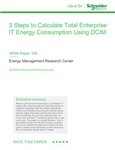OVHcloud, and Orange have joined a French research project to reduce the environmental impact of cloud applications, along with Davidson Consulting, and the French digital research agency Inria.
The "Distiller" project will examine and categorize the available tools in the cloud ecosystem, so project managers can choose the right developer systems and platforms to reduce their environmental footprint. Distiller (recommenDer servIce for SusTaInabLe cLoud nativE softwaRe) has been set up after a call from the French National Research Agency (ANR). It will engage 15 researchers, with a budget of €664,580 ($738k), and will report in three years.
Choose your cloud wisely
OVHcloud says that ten percent of France's electricity is consumed by data centers, and the sector accounts for more than four of global greenhouse gas emissions globally. The industry has approached the issue, but most efforts focus on increasing energy efficiency in the hardware at data centers, including server optimization, improved cooling, and renewable energy.
The software running on those resources can have a more significant impact, says OVHcloud, but it is difficult to tell which programming languages, libraries, frameworks, and cloud infrastructures should be used for a new cloud-native project to reduce the demands it makes on the hardware and thence on the environment.
In the Distiller project, Inria, OVHcloud, Orange and Davidson Consulting will pool their expertise, to study and categorize the tools available in the cloud software ecosystem. The group will then extrapolate that data, using AI algorithms to propose optimized configuration models.
The group hopes that looking at all layers of a cloud-native application, from infrastructure up to computer code, will allow it to derive a global approach that can drastically reduce the environmental footprint of digital services.
At the end of three years, Distiller plans to have a recommendation system that will guide product owners, engineers, and developers to choose the best software elements and design more sustainable cloud applications, which still meet demands for performance, flexibility, and confidentiality.
The project will start by studying existing cloud-native applications, and measure their environmental performance, to create a sustainability indicator. This will be used as the basis of the eventual system of recommendations.
The group promises to publish progress reports regularly on a forthcoming website.
Inria has been looking at this subject for some time. Spirals, a joint research group of Inria and University of Lille, has already created PowerAPI, a software library which reports on the energy use of IT process.
"The Distiller programme is a major step forward in the studies we have been carrying out for the past 10 years on the energy impact of software, which is now one of the Institute's priorities," said Lionel Seinturier, Head of the Spirals Research Team. "It will enable us to advance fundamental research in the field of eco-responsible digital technology and its applications, particularly in the cloud. It will contribute to the sustainability and transfer of our flagship software, PowerAPI, for measuring the energy consumption of software while encouraging the emergence of new tools to help developers adopt good design practices for their software.”
"With Distiller, we want to contribute to the design of fairer solutions to provide scientific and technical support and accompany the development of good practices for digital players," said David Olivier, R&D Director, Davidson Consulting. "Finally, we want to share these virtuous practices and our experience in this area with our ecosystem and put them into practice in the activities and projects we carry out."
“As a cloud service provider, OVHcloud's teams are committed to the Distiller project to develop knowledge about software bricks.," said Tristan Vuillier, program manager sustainability at OVHcloud "By sharing this knowledge with our customers, partners, and the community, we are committed to measuring an accurate and comprehensive environmental footprint for digital services. This complements our overall environmental strategy, going beyond the provision of renewable electricity or extending the life of our servers.”




